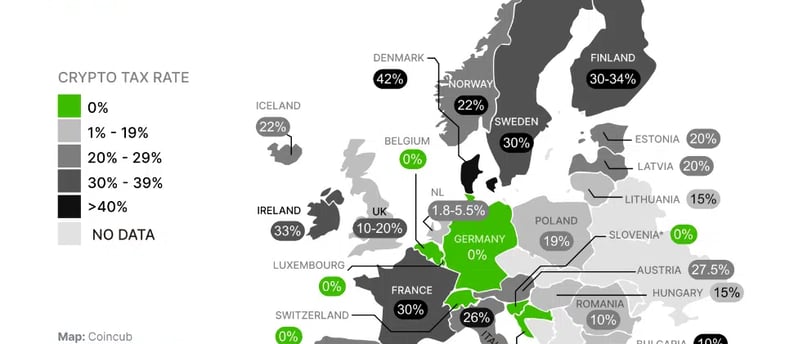Why the UAE and Switzerland Are Emerging as Top Destinations for Tax-Free Crypto Gains
Discover the top crypto-friendly countries with zero tax policies, including the UAE and Switzerland, and learn how global tax variations impact crypto investments. Stay informed on international crypto tax strategies.
11/1/20243 min read


UAE and Switzerland Emerge as Top Destinations for Tax-Free Crypto Gains
Disclosure: This article is for educational purposes only and does not constitute investment advice.
📈 Take a Crypto Trade? Use one of These Offers!
❎ BITFLEX: Double your first deposit up to 100%! Get a bonus of up to $2,000 with this referral link: https://bit.ly/4d0k9i3.
🟧 BYBIT: New users depositing over $100 can earn up to 6,045 USDT in signup bonuses. Start trading here: https://bit.ly/3MgHQaZ.
🚀 Alpha One Signals: Take my 90% Binary Options Signals: http://alphaonesignals.com/
As the global crypto market matures, varying tax policies around the world are creating distinct advantages—or hurdles—for crypto investors. Recent research by Coincub and Blockpit underscores how tax-free environments in places like the UAE and Switzerland are transforming these regions into premier destinations for cryptocurrency enthusiasts.
Global Crypto Tax Landscape: UAE and Switzerland Take the Lead
According to the report, the United Arab Emirates (UAE) remains an attractive hub for crypto investors, offering zero personal income and capital gains tax on cryptocurrency gains for individuals. The UAE’s crypto-friendly tax policies have bolstered its reputation as a top destination for high-net-worth individuals and institutions interested in cryptocurrency investments.
Switzerland also stands out as a crypto tax haven in Europe, offering zero personal income tax on crypto gains. Known for its banking legacy and stable regulatory environment, Switzerland has capitalized on its appeal to crypto investors seeking both security and favorable tax treatment.
Europe: A Patchwork of Tax Policies for Crypto Gains
Europe offers a mixed landscape when it comes to crypto taxation. While some countries provide tax benefits for long-term holdings, others impose higher tax rates that can dissuade investment. Denmark, for instance, has one of the world’s highest tax rates on crypto gains, taxing up to 53% on both short- and long-term crypto investments.
The report emphasizes that while European countries are known for their high tax rates, they also offer incentives for “long-term hodling,” providing some respite for investors committed to holding assets over extended periods.
United States: High Taxes May Drive Crypto Activity Offshore
The United States imposes some of the highest crypto taxes globally, with long-term gains taxed at an average rate of 17.5% and short-term gains taxed at 23.5%. According to analysts, these high rates could generate tax revenues upwards of $1.87 billion. However, they warn that such high taxes may discourage investment, potentially driving crypto activities underground or encouraging investors to relocate to jurisdictions with more favorable tax policies.
Emerging Markets and Crypto Adoption: Beyond Taxation
In contrast, countries like Vietnam, Turkey, and Argentina are focusing on attracting crypto investments and fostering innovation over immediate tax collection. These nations recognize cryptocurrency as an alternative to volatile local currencies, and tax-friendly policies are seen as a way to encourage technological advancements and stabilize local economies.
Looking Ahead: Global Taxation Standards for Crypto by 2025
The research also highlights anticipated shifts in global crypto tax policies, with significant changes expected by 2025. International bodies, like the Organization for Economic Co-operation and Development (OECD), are developing frameworks to increase tax transparency and reduce evasion in the crypto sector.
One such initiative, the Crypto-Asset Reporting Framework (CARF), aims to streamline reporting for crypto transactions, making it easier for tax authorities to track crypto activities across borders. Another is the Tax Administration for the Reporting of Crypto-Asset Activities (TARKA), designed to foster cooperation among tax authorities in 48 participating countries. These initiatives may set a new standard for crypto taxation, impacting how governments approach digital assets worldwide.
Conclusion: The Evolving Crypto Tax Environment
With countries like the UAE and Switzerland offering zero-tax environments, the crypto world has seen a migration of investors looking to maximize returns without tax burdens. As global regulatory bodies work towards more unified tax standards, investors may need to adapt to new international norms. However, for now, countries with crypto-friendly tax policies continue to lead the charge in attracting and retaining crypto investments.
